
China’s gateway to the world, Shanghai, is one of China’s most famous cities. Its unique blend of ancient Chinese heritage and modern western influence has attracted millions of visitors from every corner of the world. Shanghai boasts a scene of wealth and abundance. The thriving economy has made this a frequent stop for business travelers heading to Asia. With so many opportunities available in China’s biggest city, your next trip may very well be to Shanghai. Navigating the city on your own though, can be a challenge. For this very reason, most business travelers choose to hire a driver in Shanghai.
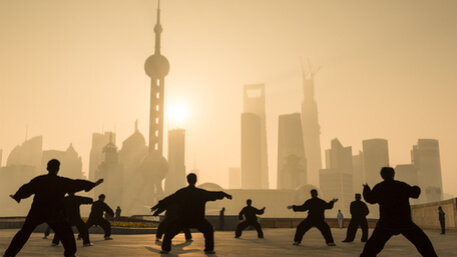
Situated on the Yangtze River Delta on China’s Eastern coast, Shanghai is one of China’s four direct-controlled municipalities. Boasting the world’s busiest container port, many importers now choose manufacturers in Shanghai to ship their goods. The city’s 24 million inhabitants are kept busy by more than just the manufacturing sector, though. The thriving fashion and technology industries ensure Shanghai’s business opportunities remain plentiful.
Perhaps more so than any other city in China, Shanghai’s visitors and residents hold a great affection for the city. So much so, that CNN once provided 50 reasons why it may be the best city in the world. While the city offers skyscrapers and business districts that rival the likes of New York, its cultural communities and culinary diversity place it towards the top of every tourist’s list when visiting Asia.
Shanghai might offer a unique blend of business and culture, but it’s not immune to China’s chaotic roads and over populated cities. Being China’s largest and most populated city means that crowds are likely to be more common than not in public places. No more so than Shanghai’s roads and public transport networks. If you’re thinking of driving yourself around, here’s why it’s not a great idea:
If you wish to get behind the wheel, you’ll have to complete the process of obtaining a Chinese Driver’s license. Your international driver’s license may work elsewhere in the world, but the Chinese Government recognizes neither the International Driver’s Permit (IDP) nor the Overseas Driver’s License. Getting an official Chinese driver’s license is not overly complicated. However, it is a tedious and timely process that you likely won’t have time for if you’re visiting for just a few days, on business.

Shanghai tends to be a very busy place. Being the most populated city in China, the roads are a reflection of just how chaotic Shanghai can be. Even if you’ve been there several times before, driving is an entirely different experience. The roads themselves are in good condition in the city center, with no abnormal potholes and narrow roads. The danger is in the sheer volume of cars you must learn to navigate around; unless, of course, you’re already experienced and very familiar with the Chinese driving culture. Another factor that often overwhelms foreigners on Shanghai’s roads is the signs along highways and city streets. If you can read Mandarin, you’ll be able to figure out where you’re going. However, deciphering any of the road signs as a first time visitor may prove to be nearly impossible. Finding yourself heading in the wrong direction might result in missing the meetings you traveled halfway across the globe to attend.
A private transfer is the safest, quickest way to get around Shanghai. China Car Service is a trusted transportation service helping foreign business travelers for almost two decades. We provide door-to-door service at competitive prices.Make your journey stress-free and contact our 24/7 team at Bookings@ChinaCarService.com with questions, or get a quote below. Use this promo code: 10CARBLOG to get a $10 discount on your 1st service. |
Taxi drivers in Shanghai are unlikely to speak any English. Most taxi drivers avoid picking up foreigners, citing the inability to communicate as a good reason to not even bother. If you do manage to find a taxi, be sure to have your address written down in Mandarin to hand over to the taxi driver. Having details lost in translation with your taxi driver is a headache worth avoiding. However, a number of car service companies can provide you with a car and an English speaking driver in Shanghai.
Luckily Shanghai’s taxi network is heavily regulated, meaning that the vast majority of their drivers and vehicles are of good standing. In a city as large as Shanghai, however, there will always be some who look to take advantage of foreigners by scamming them out of their luggage, money, or have failed to maintain their vehicles up to high standards. The high-speed trains are fantastic if you’ve never been on one, but they fail to reach every corner of the city. Meaning you’re likely to need a connecting metro service or bus to get you to your final destination. Both of which might seem a bit uncomfortable and crowded for getting to and from the office during the weekday peak hour traffic. When traveling to Shanghai on business, safety and comfort are generally at the forefront of most travelers’ minds. The only way to get around that guarantees your comfort and safety, will be to hire a driver from a car service that has proved its reliability.
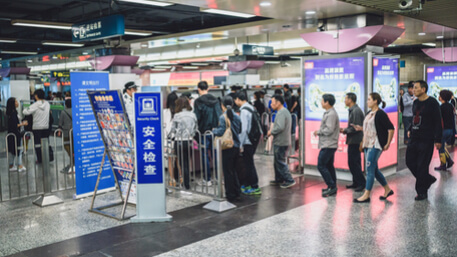
With an estimated 24 million residents, and millions of visitors every year, it’s no secret Shanghai’s public transport terminals are consistently crowded. China is famed for being the most populous nation on Earth, and there are few places where that is as obvious as in Shanghai. The queues to find a licensed taxi at the airport are long, taking up to 45 minutes before you find a taxi. The bus and train terminals are worse. Although the modern buildings are very impressive, they’ll undoubtedly be filled with commuters rushing to find seats. Never underestimate the volume of people when you’re visiting for the first time, or in a rush to catch your flight or make your meeting on time.
Hiring a driver in Shanghai is easy. There are many options online, but research should be done ahead of time. Before you book, there are some things you should consider. Booking in advance can save you time and money. Discounts are usually available if you’re booking ahead of time, and you’ll have enough time to change your booking should your travel plans change. Plus, if you have a need for a particular vehicle, booking in advance will ensure you get the car you want. Finding a driver in Shanghai, who offers additional services can be very helpful. Some companies even offer guided tours of the city, should you have time.
The process of finding a reputable company that you’re able to hire a driver in Shanghai, should always be quick and straightforward. Avoid scams and ensure that the company you choose has a payment method you’re familiar and comfortable with. Most importantly, always travel safely.
On your way to Shanghai soon? In need of a ride once you get there? Take advantage of our online discount and book today!

The Yangtze River Delta is home to China’s largest city, Shanghai. One of the world’s biggest and busiest metropoles, Shanghai has become renowned for its blend of cultural wonders, financial clout, and historic significance. Millions of tourists arrive each year at Shanghai’s two major international airports, Pudong and Hongqiao. With so many people looking to make their way in and out of Shanghai, which is the best Shanghai airport transfer route you can choose?

China is both the world’s most populous country and the fourth largest country geographically. As such, traveling to and around mainland China can, at times, be a challenge. Whether you’re a frequent traveler to China or are about to embark on your first trip, you’ll most likely be landing in either Shanghai, Hong Kong, or Beijing airport. If you’re off to Beijing and want to know how to arrange your Beijing airport transfer, here are your best options!
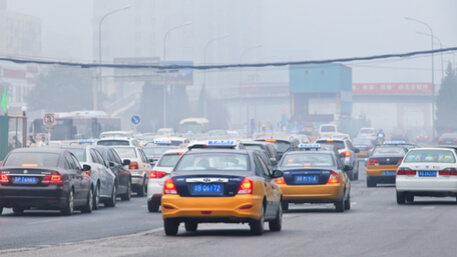
Taxis are usually the first option business travelers consider when arriving in China. The only problem with taxis is the communication barrier. If you haven’t prepared a written address for the driver and are unable to tell them where to go or answer their questions, you may be in for a frustrating trip. Unless you have a basic understanding of Mandarin and/or know how to navigate to your hotel, we wouldn’t immediately recommend you take this option. You could try, so long as you have plenty of patience and a travel dictionary with you. Drivers in Beijing, especially, have earned a reputation. Often they’ll ignore and even refuse to pick up foreign passengers altogether. Many travelers find undertaking this endeavor is not worth the hassle. If, however, you’re willing to take on the challenge, we do recommend you do some research on things to look out for before hand.
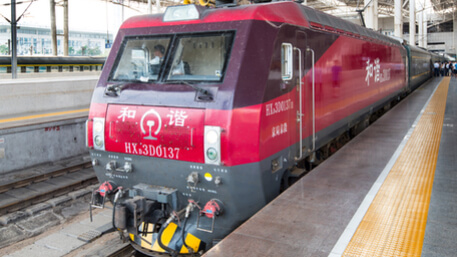
Taking the Beijing Airport Express Train is a arguably the smarter option for your transfer, considering it’s the fastest and most cost-effective option available. The Airport Express runs from Terminal 2 (T2) and Terminal 3 (T3) and has two stations in downtown Beijing; Dongzhimen and Sanyuanqiao. The cost is 25 RMB (US$ 4.00) and takes about 30 minutes to/from the airport to Dongzhimen. The only challenge with taking the Express train is that it only runs at certain times. If you’d like to catch the train, you’ll need to factor in your arrival time and plan accordingly with the train’s schedule.
Currently trains run from:
Don’t forget to consider your transfer from either Dongzhimen or Sanyuanqiao. Once you arrive, you can either take the Beijing metro, a taxi, or simply walk to your hotel (depending on proximity). The proverbial “last mile” can be vary in difficulty depending on the time of year you’re visiting Beijing. The air pollution is infamous all year round, though it has improved in recent years. If you’re traveling to Beijing in the summer months, expect to be walking in dry heat (we recommend a hat and sunscreen).
A private airport transfer is the safest, quickest way to get from Beijing airport to your hotel. China Car Service is a trusted transportation service helping business travelers to China for almost two decades. We provide door-to-door service at competitive prices.Make your journey stress-free and contact our 24/7 team at Bookings@ChinaCarService.com with questions, or get a quote below. Use this promo code: 10CARBLOG to get a $10 discount on your 1st service. |
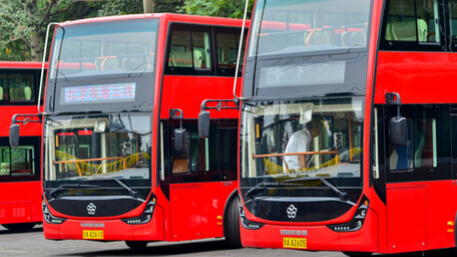
If your hotel is close to the airport, taking an airport shuttle bus would be significantly more convenient. Getting a hold of tickets isn’t difficult. You can purchase your tickets from the ticket booth at any of the airport terminals once you’ve landed. Luckily, the ticket booths are labeled in English, as well as Mandarin, and are fairly easy to locate within the arrivals hall. Something to consider is that most of the drivers won’t be able to communicate in English. Hence, getting out at the correct stop will be entirely up to you. Make sure to do a quick research on the route before hand, and know exactly which stop to get off at. Consider, also, downloading a handy translation app.

Possibly the most convenient and comfortable transport is hiring a car with a driver. This could save you a lot of possible worries when traveling in Beijing. This door-to-door service is generally preferred by most business travelers in China, as it’s a simple and effective means of getting around. In what is otherwise a complicated and congested city, flexibility is a key aspect. If your flight is delayed or if you’ve arrived a little earlier than your scheduled time, you won’t be left stranded at the airport. You’ll have the comfort of traveling in a luxury private car and won’t have to deal with the stresses of having to make connections or changing between multiple modes of transport. With your flights and accommodation booked for your trip to Beijing, consider some of the following before deciding on how to book your airport transfer:
Beijing hosts millions of tourists and business travelers every year. With a thriving economic scene at the heart of China and a booming tourism industry, there is no shortage of travel options. However, not all of those options are best suited to business travelers.. Arranging your airport transfer can be easy, if done ahead of time. Using a reliable car service, or simply planning in advance if you’re hopping on a train, shuttle, or taxi.
Many business travelers often need to arrange their transfer from the Beijing International Airport to Tianjin; the neighboring city, host to a number of manufacturing facilities. If you happen to be visiting Tianjin on your next trip to Beijing, you can check out this article on the 3 best ways to get from Beijing airport to Tianjin.
Getting around China with its busy traffic, chaotic driving styles, and a difficult language barrier can be stressful, to say the least. If you’re looking for a reliable airport transfer service in numerous Chinese cities like Shanghai, airport pickup in Xian, Chengdu, Taipei and car service in Hong Kong, here are the guides on how to arrange it and make your trips to these cities hassle-free.

October welcomes the next edition of the Canton Trade Fair . What is possibly the world’s most well known, and certainly the biggest, trade show welcomes visitors from every corner of the globe. All eager visitors, hoping to do business, meet some reliable suppliers, and gain an advantage in the Chinese market. Finding a quality hotel, close to the fair, is worth its weight in gold to those planning long days at the expo without wanting to battle China’s infamously chaotic roads and peak hour public transport routes. If you’re still looking for a place to stay while at the expo, here are this year’s best Canton Fair hotels!
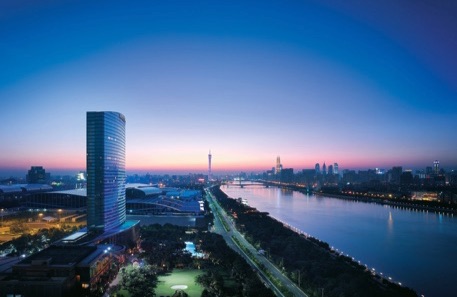
If you’re after a high-end and luxurious stay, to rest your body and mind in between long days at the exhibition, then the Shangri-La hotel is one of the best Canton Fair hotels. Located a mere 200 meters from the exhibition halls, you’ll be able to walk to the show and back each day without minimal hassle. Some experienced guests even choose to make the short walk back to the hotel during their lunch break to sneak in a quick nap or find solitude from the crowds and attend to emails or calls in the privacy of their rooms.
The staff is renowned for being highly attentive and accustomed to the needs of Canton Fair visitors. Most of the staff speak fluent English and even offer the ability to assist you with acquiring your badges for the fair. Priced on average at $570 per person each night, the rooms themselves are perfectly suited to the luxurious business traveler. Wifi is excellent throughout the hotel, although China’s usual website restrictions still apply unless you’ve set up your own VPN network. The restaurant food is excellent. Surely one to consider.
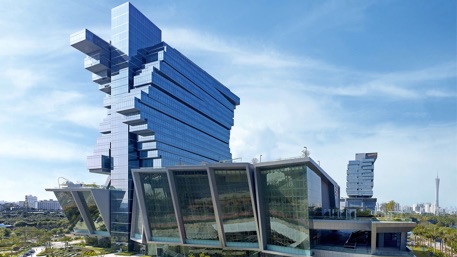
Described as a ‘Gem on the Pearl River,’ Langham Place offers the type of modern sophistication and comfort that most business travelers seek. Priced on average around $530 per night, the rooms and hotel are known for being supremely comfortable and ideally suited for the business traveler. The staff is famously friendly and helpful, and like any of the best Canton Fair hotels, their employees are well trained to assist the needs regular visitors might have during their stay. The dining at Langham Place is worth the stay alone. Their Italian restaurant, Alfresco is acclaimed to visitors throughout Guangzhou. With the fair being just over a mile away from the hotel, your distance heading into the exhibition halls each day is certainly within walking distance. The only perceived downside to Langham Place, however, is that there aren’t many other attractions within walking distance of the hotel should you wish to explore.
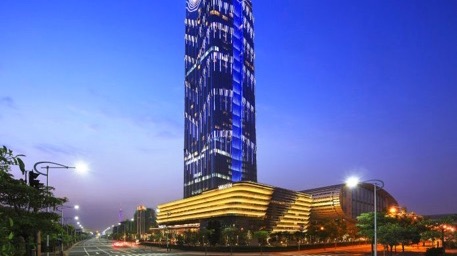
For those visiting China with the sole purpose of attending the Canton Fair, there are few better choices than the Westin Pazhou. Situated alongside the convention center, the hotel couldn’t be any more convenient for those spending long days at the fair. The hotel provides every luxury you can expect from any of Guangzhou’s luxury five-star offerings but is priced slightly lower at an average of $380 per night. Large rooms are designed for business travelers likely to be attending events at the convention complex, allowing you to get work done comfortably from your room. Although the hotel’s fully equipped business lounge will likely pull you from your room, as it provides you with many of the office comforts you might wish for on your travels. Equipped with computer workstations, high-speed Internet, and an array of services on offer such as copying, faxing, printing, courier services, and express mail. There are even two reasonably sized meeting rooms that guests can make use of, with full conference call and secretarial facilities. Although it’s situated perfectly alongside the convention center, those wishing to explore a bit more of Guangzhou will have to try their luck at catching a taxi to visit restaurants or the local shopping districts. Hailing a taxi in China can be tough at the best of times for foreign travelers, so most experienced visitors tend to opt for a private car service with English speaking drivers they can rely on to take them wherever they wish to visit.
Preparing for a trip east? A private transfer is the safest, quickest way to travel from airport to the city. China Car Service is a trusted transportation service helping business travelers for almost two decades. We provide door-to-door service at competitive prices.Make your journey stress-free and contact our 24/7 team at Bookings@ChinaCarService.com with questions, or get a quote below. Use this promo code: 10CARBLOG to get a $10 discount on your 1st service. |

Priced at an average of $260 per person (per night), compared to an average of $400 per night at some of the five-star options in Guangzhou; the eStay Residence in the poly world trading center is possibly one of the better value for money options amongst the best Canton Fair hotels. Located on the South bank of the Pearl River, just 2 km’s away from the exhibitions halls. This cost-effective residence is still within walking distance, should you choose to get in a little exercise each day. The taxi or car ride there should only take a few minutes. Enjoy the comfort and convenience whilst attending the world’s largest trade show. The rooms are well equipped for those traveling on business, however, not all of the staff can speak English. For this reason, accommodating for any doubts about the Canton Fair or similar requests may be a bit tricky, so prepare accordingly.
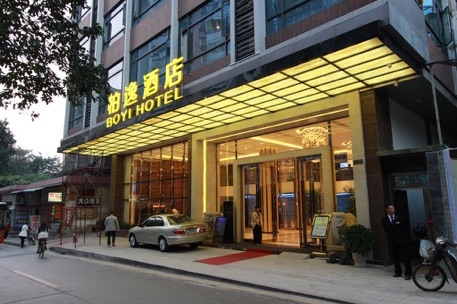
Rounding off the list for best Canton Fair hotels, is the Boyi Hotel. Proving popular with small business owners or travelers seeking the best value for money during their visit to Guangzhou. The rooms are incredibly affordable at an average of just $200 per person (per night). Situated not far from one of the tallest buildings in Guangzhou, the Poly World Trading Center, the 4 star Boyi is just about 2 kms away from the Canton Fair. Still within walking distance, should you be inclined. If you’d rather take a more comfortable means, using a car service is probably the easier option. Although finding English speaking hotel staff can be difficult, a big bonus is some great choices of local restaurants just around the corner from the hotel.
The Canton Fair can offer some exciting opportunities. Planning ahead is a great idea, and consulting a site map of where the vendors are situated will most likely benefit your schedule (save hours of your time from aimless walking around) and ultimately prove invaluable to your business!

For those who take to the skies regularly, most airports begin to take on a familiar look and feel. If you travel often enough, business class lounges all begin to look the same, too. Despite the obvious benefits that some may have to offer. With that being said, some airports do differ from others in the way they do things, especially in China. Air travel can, at times, be a complicated process in China. Unfortunately, delays and small inconveniences often arise. To limit these, we’ve found and listed the 3 best international airports in China.
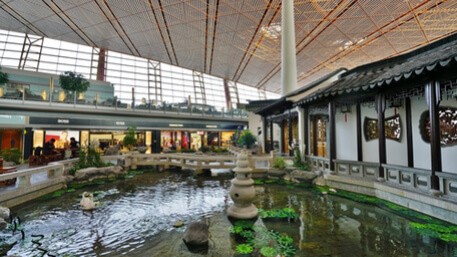
Where better to begin than with China’s biggest airport? With nearly 95 million passengers passing through its terminals each year, Beijing Capital International is one of the biggest international airports in China, and in the world. All international flights are routed through the impressive Terminal 3, which was built ahead of the 2008 summer Olympics that Beijing hosted. The new terminal also boasts restaurants that cater to both local and western palates.
If you’re departing from Beijing Capital, it’s best to plan for extra travel time. Beijing is famed for its heavy traffic and getting to the airport can take a while. Though traffic is worst at peak hours, the route to the airport is full of winding highways.
To escape the crowded roads, many travelers opt for the airport express train. It operates from the Dongzhimen and Sanyuanqiao subway stations for most of the day (the last trains departing at 10:30 PM). As a business traveler, however, the express train is not without its own hassles. If you’re carrying large luggage, for example, squeezing onto busy trains and navigating long queues can be challenging.
Though the express train is the faster option, the best option for getting to the airport safely, comfortably, and without hassles (other than the inevitable traffic) is making use of a private car service. These offer ample space for your luggage, without any waiting in queues for taxis or transferring between train stations with all your luggage. More so, a car service will pick you up at your doorstep and drive you the entire way.
Once you’re safely inside the airport, prepare for some lengthy security lines. This is especially true if you’re traveling around the holiday seasons, such as Chinese New Year. Luckily, the airport does offer free wifi, so you can catch up on work if you choose to arrive earlier. That’s not to say that you’ll be able to access your Gmail or update your Facebook status, however. The great ‘firewall of China’ is alive and well within the airport. You’ll need a VPN service to get around it. Make sure to download one on your computer and phone before arriving to China, otherwise you’ll have to wait until you’re back outside the country.
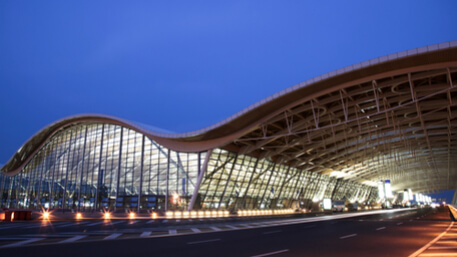
The younger of Shanghai’s two international airports, Pudong was opened in 1999. Located just 30 kms outside the bustling Shanghai CBD. Getting to and from Pudong isn’t as difficult as other airports in China, especially with the Maglev train.
The train is an experience on its own. Famed for being the world’s first commercially operated high-speed magnetic levitation train, it holds the title for the world’s fastest commercial service; reaching speeds of 431 km/h! Let’s not forget, Shanghai is one of the world’s most populated cities. The trains might be quick but getting a seat on one isn’t. As with any public service in China, you’re bound to face long queues to find tickets and your seat (unless you’ve booked well in advance). Using the train isn’t the only way to get to the airport, however. Most locals make use of regular subway lines or find local taxis to drop them off. However, the use of packed subway lines and taxis in China can be difficult. Taxis, in particular, are famed for refusing to pick up foreign passengers. They’ll often claim the language barrier is too much of a hassle.
The airport itself acts as a hub for some of China’s biggest airlines, like China Eastern Airlines, Air China, and cargo giant DHL. The two major terminals, flanked on either side by four parallel runways, is soon to be joined by a third major terminal. This will increase its annual passenger capacity from 60 million to 80 million passengers per year! All of whom will soon be able to enjoy all the amenities that modern airports in China boast.
The airport is fully equipped with an array of fast food outlets and restaurants familiar to western travelers, and even hosts the famed No. 77 China Eastern Plaza Premium Lounge. This business class lounge consistently ranks amongst the best in the world. With a buffet serving a selection of both Chinese and Western-style food items, a live cooking station will even prepare fresh Shanghai- and Hong Kong-Style signature noodles for guests upon request.
Business travelers can catch up on work with any of the five computer workstations, complimentary Wi-fi, and telephones. Also, the lounge offers a flight information monitor, so you can keep track of the status of your flight. Other amenities include a TV, a selection of newspapers and magazines, recharging stations, three showers, nursing room, leisure area, relaxation area, disabled access, and a separate smoking room.
Preparing for a trip east? A private transfer is the safest, quickest way to travel from airport to the city. China Car Service is a trusted transportation service helping business travelers for almost two decades. We provide door-to-door service at competitive prices.Make your journey stress-free and contact our 24/7 team at Bookings@ChinaCarService.com with questions, or get a quote below. Use this promo code: 10CARBLOG to get a $10 discount on your 1st service. |
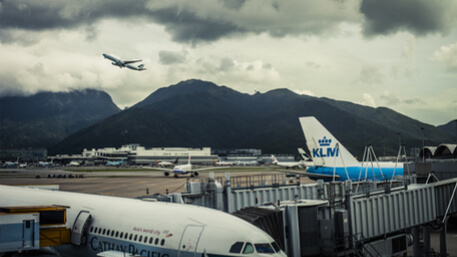
If you’re lucky enough to be flying into Hong Kong airport during daylight hours, the airport approach offers a beautiful view. Located on the island of Lantau, the breathtaking approach flies over the buildings and mountains that border the city.
Considered one of Asia’s major transport hubs. Flights arrive to this airport from all corners of the globe. It’s popular amongst travelers because of the excellent dining and shopping available at the airport. With major international brands like Zara, Jimmy Choo, MAC, and even an M&M’s world. Not to mention, an array of smaller design boutiques; it’s not hard to see why passengers often board their flights with more than one shopping bag. For those looking to grab a bite to eat, there are large food courts in both the eastern and western halls of the terminals offering both Asian and Western delicacies like Pizza Express, Starbucks, Cafe Deco, and other popular options.
For business travelers looking for an opportunity to relax, the Cathay Pacific Bridge Lounge is worth a visit. Situated near Gate 40 in the Western Hall, the lounge offers the widest selection of amenities and luxuries, including private cabanas. The bridge is ranked amongst the top 10 best airport lounges in the world. Many would argue it comes out on top in the rankings for best business lounges in China’s major airports. In fact, in 2016 the lounge was voted World’s Best First Class Airline Lounge by Skytrax customers.
Designed by Foster and Partners, the lounges were clearly designed with comfort in mind. Guests can expect a restaurant quality Eastern and Western dining experience inside the lounge. They may dine from the Bistro menu, or enjoy freshly baked bread and pizza from The Bakery. The Long Bar provides a view over the airport’s tarmac as guests sip on signature cocktails, fine wines, or champagne.
Other noteworthy facilities include private shower suites (with complimentary towels and amenities); and IT Zones (including phones, printers, and high-speed web access) that will help keep the traveling experience comfortable and productive. With access to this lounge, the Hong Kong International Airport is one airport in China you won’t mind a transfer to.
On a side note, getting to the airport can be tricky when traveling by taxi. As with anywhere in China, taxis are prone to scamming tourists and taking advantage of the language barrier. They’ll use this barrier to try and convince you that you have no choice but to pay their exorbitant and illegal fees. Experienced travelers usually make use of a private car service with a driver, or hop on board the Airport Express train. A great feature that the train terminals offer is the ability to check-in your luggage at the station before arriving at the airport. If you board at the Hong Kong central station of the Kowloon station, you’ll be able to check in your luggage and even receive your boarding pass before arriving at the airport. Meaning once you get there, you can proceed straight to security before boarding your flight.
Traveling in China doesn’t have to be complicated. As a leader in the world’s economy, China has been generous in investing on its travel infrastructure, particularly its international airports in China. If you’re fortunate enough to be heading to China soon, you’re likely to find their international airports on par with those you’ll find in the West.
Whether you’re visiting China for the first time, or the hundredth, the experience can be overwhelming at times. Any seasoned business traveler will know there are always ways of improving your travel experience. Enjoying the perks of visa-free travel in China is one simple way to improve your travels! If you’re heading East soon, you might be eligible for travel without a visa, here’s what you need to know.

China has quickly established itself as a world leader. Which means there’s a multitude of businesses across the globe, looking to capitalize on China’s booming economy. Doing business in China is very different from most places in the world. The Chinese business culture has a number of unique traits.


The 5,500.3 miles (8,851.8 kilometres) of the Great Wall of China stretch far across Northern China. From Hushan, in Liaoning, to Jiayuguan Pass. It travels over deserts, grasslands, mountain ridges, and finds its end on the waters of China’s Eastern coast.
Most sections of the Great Wall that are commonly visited and photographed were built during the Ming Dynasty (1368–1644). Due to factors such as erosion, adverse weather conditions, and negligent human behavior, over 30% of the Great Wall has either deteriorated or disappeared completely. The most popular and well-preserved sections are situated around China’s capital city, Beijing.
Being one of the most popular tourist destinations in China, there are multiple routes to reach the Great Wall. The wall is approximately an hour and a half drive from Beijing. There are no direct buses/trains from Beijing to the Great Wall, which means you’d need to make transfers along the way. This might be a bit complicated in a foreign environment, as the majority of the population cannot speak nor understand English. There are tour buses that can take you to the Great Wall direct. However, make no mistake, year round these buses will usually be extremely crowded. The Great Wall is just attractive to foreign tourists as to the millions of local tourists wanting to see the glory of their home country. You’ll be guaranteed an authentic“Chinese tour experience,” huddled from place to place along with the masses.
For a non-crowded and much easier experience, we recommend taking a private taxi or guided tour. Not only will you avoid the discomfort of crowds and long queues, you’ll be able to appreciate the The Great Wall at your own pace. Skip the crowds. Experience, first-hand, the story behind the longest human construction in history.
Preparing for a trip to Beijing? A private transfer with a professional driver is the safest, quickest way to travel from airport to the city. China Car Service is a trusted transportation service helping business travelers for almost two decades. We provide door-to-door service at competitive prices.Make your journey stress-free and contact our 24/7 team at Bookings@ChinaCarService.com with questions, or get a quote below. Use this promo code: 10CARBLOG to get a $10 discount on your 1st service. |
 Clothing
ClothingWhen visiting the Great Wall of China, it’s best to dress as comfortably as possible. You’ll be doing a fair amount of walking and hiking along the wall. Some sections can get quite steep. Make sure you have comfortable shoes and bring a sweater or jacket along, in case it gets cold or windy.
Depending on your schedule, you may be hiking for about 2 – 3 hours. Bring some snacks and plenty of water; be sure to prevent dehydration. The Badaling Section is the only section where you’ll have the chance to buy something on the Great Wall. In case you forget, you can purchase some snacks and water in Badaling. However, the merchants seize this opportunity to raise their prices comparable to airports and amusement parks.. It’s important to note that the only bathrooms are at the entrance, so drink your water smartly; there will be no washroom halfway.
Since Mother Nature is unpredictable, it’s best to be prepared for all weather conditions. An umbrella is a popular and useful accessory for your trip to the Great Wall. It’ll protect you from both sun and rain. And don’t forget to wear sunscreen and a pair of sunglasses, the sun can be unforgiving. We’d also recommend taking a hat for further protection.
The Great Wall’s most famous sections are located in its suburban areas. The three most visited sections are Badaling (most popular amongst local tourists), Mutianyu (most popular amongst foreign tourists), and Juyongguan (one of the most spectacular Great Wall Forts). These sections are all well restored, easily accessible, and provide straightforward hiking trips. They’re known to be quite family/child friendly. If you’re looking to travel to the wall during your flight’s long layover, or just have a bit of time to spare on your trip; a visit to any of these sections is your best bet. The quickest way to get to these sections of the Great Wall from Beijing, is by traveling by car, especially during peak seasons, as trains and buses fill up fast and you may have to wait quite some time for the next lift.
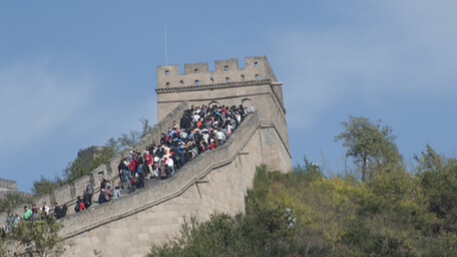
Although less crowded, certain sections have also been developed into popular and scenic spots, but are less crowded, allowing for better photographic opportunities and for you to explore the new 7th World Wonder at a more leisurely pace. Jinshanling (popular hiking route) and Simatai (incredible display of architectural features) have been equipped with cableways to take you up the Great Wall if you would like to save some time. Certain parts along Simatai are restricted and since one needs to go through the Gubei Water Town to reach Simatai, you are required to make a reservation at least one day in advance on Water Town’s official website if you wish to visit the Great Wall.
Another section worth visiting is the Huangyaguan Pass. Built along the mountains, it provides a wonderful hiking route for tourists with captivating views down the steep mountain. It is one of the best Great Wall sections to visit from Tianjin and is also where the annual Great Wall Marathon is held in May.
In addition to admiring the Great Wall, Xiangshuihu is a site rich in heritage and tradition. After your climb, you can pay a visit to the Health Preserving Valley located to the north of the mountain. The valley is a relatively short hike of 1.6 miles (2.5 kilometres). There you will find health preserving aphorisms left by famous doctors, secret recipes written on the stones, and hundreds of medicinal herbs across the area.
Very popular amongst hikers and adventurous travellers, Wild Great Wall are the sections that have not been renovated and therefore have kept their original appearance. Although they are broken-down they still reveal the history and true architectural magic of the wall. Popular wild sections include Jiankou and Gubeikou.

For those accustomed to regular travel, it’s not unusual to have to deal with paperwork, health certificates, visa offices, and the endless checklists to fulfill when obtaining a visa. With China now comfortably placed as the world’s second-largest economy, it’s no wonder that millions of business travelers include Hong Kong as one of their top destinations. If you’re one of these travelers, this is what you’ll need to know before you proceed with your Hong Kong visa application.
Most people are still likely to need a visa, so don’t go packing your bags and purchasing a ticket just yet! Hong Kong and China allow for a number of exceptions, which deem visitors exempt from visa requirements, or applicable for a visa upon arrival. If you hold a passport from this select list of countries, you may not even need a visa.
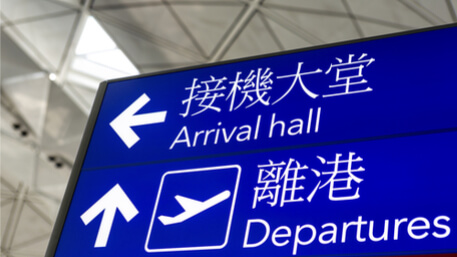
If you’re transiting through Hong Kong as a pit stop before your final destination, before making your way to Singapore or Tokyo for example, and are in the city for less than 24 hours, you naturally won’t need a visa. Again, you’ll need to be using Hong Kong as a pit stop before your final destination but if you happen to be visiting one of these 18 cities, you’re free to roam around, take in the sights and sounds or conduct business meetings without a visa.
If you’re from Japan, Singapore or Brunei and need to conduct business or visit family members, China grants you a 15 day stay without the need for a visa. The city of Hainan allows organized groups traveling with five people or more to stay up to 15 days without the need for a visa.
Preparing for a trip east and ready to enjoy visa-free travel in Hong Kong? A private transfer with a professional driver is the safest, quickest way to travel from airport to the city. China Car Service is a trusted transportation service helping business travelers for almost two decades. We provide door-to-door service at competitive prices.Make your journey stress-free and contact our 24/7 team at Bookings@ChinaCarService.com with questions, or get a quote below. Use this promo code: 10CARBLOG to get a $10 discount on your 1st service. |
China Visa Application
If you are not among countries with visa-free travel in China and need to pursue a China visa application ahead of your trip, it’s worth knowing there is more than one type of business visa available.
As one of the more regular business visas on offer, the F visa applies to individuals who are invited to China for non-commercial business exchanges, education events, science-related expeditions or medical visits. If you’re visiting China to attend the Canton Fair for example, or you’re inspecting factories and possible manufacturing sites for your goods, the F visa will apply. It’s important to remember that to qualify for an F visa, you’ll need to acquire an invitation from the business entity you’re visiting. If you’re visiting the Canton Fair you can apply for the invitation on their official website.
When travelling to China to conduct regular business or trades, this is the China visa application you need to pursue. With this visa you are not allowed to be employed or work for a company registered and operating in China, but it does allow doing trade business.
If you plan on doing business in China and being paid by a company registered and operating within Chinese territory, you’ll need to get a long-term Z visa. China won’t grant this visa unless the company you’re working for is able to provide proof that you’re an expert in your field. If you’re found to be earning money in China without a valid Z visa, there is a risk of being deported. The visa itself is only valid for 30 days, which means that when applying for it, it’s best to apply for a temporary residence permit that lasts 5 years under the same conditions.

If you’re planning on making use of China’s transit visa rules and bypass the need for a China visa application by staying for less than 72 hours, you’ll still need a valid passport, onward ticket to your next destination, a valid visa for your final destination and a fully completed arrival/departure card available at the airport. Once landing in China, to obtain your 72-hour transit visa do the following:
Tip: The visa application form can be downloaded and saved to your computer, where you can complete it and print it for submission. Be sure to complete every field, if you leave a section blank the application will be rejected and will need to be submitted again. If a certain field doesn’t apply to you, rather fill it with ‘N/A’. When printing, be sure to print and submit only single-sided pages, anything printed back to back will be rejected, as will any handwritten forms.
 Tip:
Tip:
There are many travellers who get their visas denied due to poor quality passport photos during the time of application. You’ll need to submit 2 full-faced passport style pictures with a white background for your application. Ensure the photos are clear, anything blurry or unclear will be rejected. It’s also essential that the pictures have been taken within the last 6 months.
Tip: With any China visa application for business, you’ll need to provide an original Letter of Duly Authorized Unit or Confirmation of Invitation issued by the relevant Chinese entity you’re planning on trading or meeting with. If your spouse or children are joining you for the trip, they’ll need to be included on the letter or invitation.
Candidates who qualify for the top tier, by accumulating a visa score above 85 points, are able to receive paperless verification at borders, pre-entry visas and expedited approvals that encourage the highest qualifying foreigners to apply, live and work within China with ease.
Candidates who achieve a Hong Kong visa application score between 60-85 points are deemed to have professional skills that are required within the Chinese labour market at the time of application. The application itself is no easier than usual, and is still a fairly controlled process.
The lowest tier of a candidates is for those who achieve a Hong Kong visa application score that is lower than 60. A number of visas granted for this category are limited each year, and are slightly difficult to obtain.
If you plan the journey which requires a transfer from Hong Kong Airport to Shenzhen, select the most expeditious and comfortable way to travel with a reliable car service.
Now that you have all the necessary steps to obtain the right visa for your travel to China, here are a few useful things you might want to bring with you.

Learning to do business in your own country can be a challenge. Now, imagine expanding your operations to an entirely new country where you don’t even speak the language! Cultural, financial, and legal considerations aside, overcoming the language barrier is arguably the most difficult challenge every businessman coming into China faces. Not being able to communicate clearly with your suppliers abroad can be detrimental to your business. If this issue is not immediately addressed, it can ultimately harm the growth of your business and brand. It’s easy to understand why overcoming the Chinese language barrier will be crucial to your business’ success.
Before you rush out and sign up for a Chinese language crash-course, here are some techniques you can use on your next trip to China:

Many countries around the world have more than one national language. South Africa, for example, has a staggering 11 official languages! Popular business and tourist destinations like Singapore and Switzerland have four official languages. China is another great example, with Mandarin being the country’s “common language,” Cantonese is still very prevalent in Southern China; in cities like Guangzhou, Hong Kong, and Shenzhen.
Knowing which languages are spoken in the particular region of China you’re visiting is a great first step. This allows you to begin learning a few key phrases and even target marketing campaigns in your customers’ local language.
This also shows great respect and admiration; since you’ve taken the time to learn and understand the local language and, hopefully, some local customs.

Both Mandarin and Cantonese are difficult languages to learn in a short time. Especially because they differ vastly from English, or practically any of the Western languages. A popular method to overcoming the Chinese language barrier is making use of an interpreter to convey your message across accurately.
In China, there are a number of online classified ads for interpreters and translators. The risk with finding an interpreter via the classifieds is you’ll be dealing with a stranger, who you can’t easily be certain will be able to portray your message accurately once you arrive.
One popular way of finding a trusted interpreter is by hiring a professional and reliable transport company that already employs English speaking drivers. You can “kill two birds with one stone” by hiring both a capable and understanding interpreter and driver. Convey any message you wish to portray while also having your transportation figured out.
Google Translate is definitely one of the best online resources to help break the language barrier; it’s simple and basic. It also has some other powerful features, like offering a native speaker’s pronunciation of a word or phrase.
Nevertheless, it’s worth remembering that China’s ‘great firewall’ is still very much in effect throughout the entire country. If you wish to maintain access to your Facebook, Instagram,, Gmail, and of course Google Maps, you must install a VPN on your phone or other devices. Otherwise you’ll be unable to bypass China’s internet restrictions. However, even with a VPN, the Internet speed in China can be significantly worse than what you’re used to. Android phones are particularly affected in China, as most of their main functions are Google-driven. Luckily for iPhone users, these aren’t as heavily affected.
We hope these three tips will help you in breaking that language barrier on your next visit to China! 中国欢迎你 (China welcomes you!)